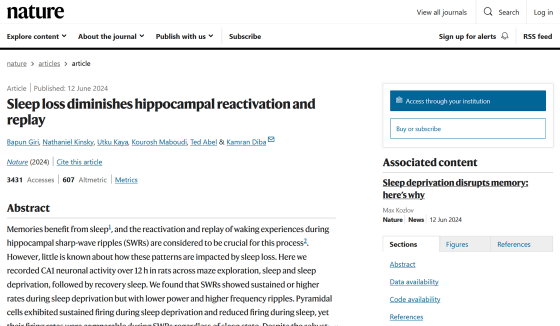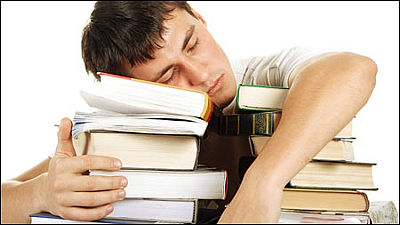It turns out that lack of sleep disrupts important brain signals in the hippocampus involved in memory formation

Some people may have had the experience of cutting down on sleep time to study before school tests or qualification exams, but in recent years, it has been
Sleep loss diminishes hippocampal reactivation and replay | Nature
https://www.nature.com/articles/s41586-024-07538-2

Sleep deprivation disrupts memory: here's why
https://www.nature.com/articles/d41586-024-01732-y
Studies uncover the critical role of sleep in the formation of memories | ScienceDaily
https://www.sciencedaily.com/releases/2024/06/240613140906.htm
Nerve cells (neurons) in the brain rarely fire alone; often multiple neurons fire in coordinated rhythmic or repetitive patterns.
One such firing pattern, called ' sharp-wave ripple' (SWR) , occurs when a large group of neurons fire in extremely synchronized fashion, followed by a second large group of neurons at a specific tempo. Sharp-wave ripples occur in the hippocampus , an area of the brain that plays a key role in memory formation, and are thought to facilitate communication with the neocortex , where long-term memories are stored.
It is known that ripple waves increase in frequency after learning, and it has been suggested that they may be accelerating the replay of brain activity patterns that occurred during past events. For example, when an animal passes a particular spot in its cage, a group of neurons in the hippocampus fires, forming a neural representation of that spot. Later in sleep, the firing of the same group of neurons is reproduced as ripple waves, which may solidify the experience as a memory.

Previous research has shown that mice with disrupted ripple waves have difficulty in memory tests, and that ripple waves occur not only during wakefulness but also during sleep. Based on these findings, it is believed that ripple waves during sleep are particularly important in converting short-term memories into long-term memories.
However, there have been few studies to date that have directly manipulated sleep duration to examine how sleep affects ripple waves and memory. So Diba and his team conducted an experiment in which seven rats explored a maze for several weeks and recorded hippocampal activity. Some rats were given normal sleep, while others were periodically disrupted from sleep. The results of this experiment revealed that the brains of sleep-deprived rats showed unexpected reactions.
Surprisingly, the sleep-disrupted rats still produced ripples at a frequency similar to or even higher than that of normal sleepers, but the ripples were weaker and less organized, indicating a marked decrease in the repetition of previous firing patterns.
In addition, when the sleep-deprived rats were given normal sleep for two days, the repetitive ripple pattern was restored to some extent, but not to the same extent as the rats that had normal sleep.

The results of this study suggest that memories continue to be processed in the brain even after an experience, and that post-experience processing is important. In the future, Diba and his team hope to elucidate the nature of memory processing during sleep, the need for reactivation of memory processing, and the effect of sleep pressure on memory.
Related Posts:
in Science, , Posted by log1h_ik







